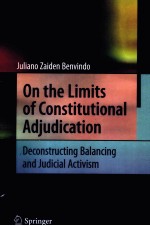图书介绍
ON THE LIMITS OF CONSTITUTIONAL ADJUDICATIONPDF|Epub|txt|kindle电子书版本网盘下载

- JULINO AIDEN BENVINDO 著
- 出版社: SPRINGER
- ISBN:3642114334
- 出版时间:2010
- 标注页数:421页
- 文件大小:22MB
- 文件页数:440页
- 主题词:
PDF下载
下载说明
ON THE LIMITS OF CONSTITUTIONAL ADJUDICATIONPDF格式电子书版下载
下载的文件为RAR压缩包。需要使用解压软件进行解压得到PDF格式图书。建议使用BT下载工具Free Download Manager进行下载,简称FDM(免费,没有广告,支持多平台)。本站资源全部打包为BT种子。所以需要使用专业的BT下载软件进行下载。如BitComet qBittorrent uTorrent等BT下载工具。迅雷目前由于本站不是热门资源。不推荐使用!后期资源热门了。安装了迅雷也可以迅雷进行下载!
(文件页数 要大于 标注页数,上中下等多册电子书除外)
注意:本站所有压缩包均有解压码: 点击下载压缩包解压工具
图书目录
Part Ⅰ German and Brazilian Constitutional Cultures: Constitutional Adjudication and Activism3
1 An Approach to Decision-Making3
1.1 Introduction3
1.2 The Crucifix Case4
1.3 The Cannabis Case11
1.4 The Ellwanger Case19
1.5 Final Words29
2 Balancing Within the Context of German Constitutionalism: The Bundesverfassungsgericht’s Shift to Activism31
2.1 Introduction31
2.2 Balancing Within the Triadic Framework of the Principle of Proportionality: A Brief Introduction39
2.3 The Bundesverfassungsgericht in the Postwar Crisis: The New Representative of the Legal and Social Order48
2.4 The Bundesverfassungsgericht’s Shift to Activism: From Subjective Rights to Objective Principles and the Consequences in Judicial Review57
2.5 The Constitutional Scholarship Reaction Against the Bundesverfassungsgericht’s Shift to Politics and the Irrationalism of Balancing68
2.6 Final Words80
3 Balancing Within the Context of Brazilian Constitutionalism: The Supremo Tribunal Federal’s Shift to Activism83
3.1 Introduction83
3.2 The Supremo Tribunal Federal in the Democratization Process: the Federal Constitution of 1988 and the Opening to Activism88
3.3 Balancing in the Decisions of the Supremo Tribunal Federal: The Quest for Rationality in Decision-Making109
3.4 Final Words130
Part ⅡI The Debate on the Rationality of Balancing135
4 The Aim to Rationalize Balancing Within the Context of Constitutional Courts’ Activism135
4.1 Introduction: The Quest for a Systematization and Rationalization of Balancing135
4.2 Robert Alexy’s Special Case Thesis (Sonderfallthese)139
4.3 The Quest for the Rationality of Balancing: The Core of Robert Alexy’s Theory of Constitutional Rights143
4.4 Final Words157
5 When Differance Comes to Light: Balancing Within the Context of Deconstruction161
5.1 Introduction161
5.2 Differance and the Political-Legal Realm of Deconstruction166
5.2.1 Jacques Derrida and Differance166
5.2.2 Differance and Constitutional Democracy: The Democracy to Come174
5.2.3 The to Come in the Negotiation Between Constitutionalism and Democracy182
5.2.4 Differance Within the Context of Decision-Making: The Negotiation Between Law and Justice and the First Insight into Legitimacy186
5.3 Balancing Within the Context of Differance194
5.3.1 Introduction194
5.3.2 Balancing and the Logos of Correctness-Rationality196
5.3.3 Balancing and the Logos of Legitimacy218
5.4 Final Words239
6 When Procedures Towards Mutual Understanding Come to Light: Balancing Within the Context of Proceduralism243
6.1 Introduction243
6.2 The Claim to Coherence in Robert Alexy’s View: When Rights Lapse into General Practical Discourse246
6.3 The Post-Metaphysical Response to Balancing as an Indispensable Instrument for Coherence: The Coherence and the Single Right Answer Within Democratic Procedures of Opinion - and Will Formation250
6.3.1 Introduction250
6.3.2 Klaus Gunther’s View: Coherence Through the Distinction Between Discourses of Justification and Discourses of Application251
6.3.3 Ronald Dworkin’s View: Integrity in Legal Reasoning and the Claim to the Single Right Answer as a Response to Coherence265
6.3.4 Jurgen Habermas’s View: Between Facts and Norms Within Democratic Procedures of Opinion - and Will Formation279
6.4 The Metaphysics of Balancing from the Perspective of the Proceduralist Account305
6.4.1 Introduction305
6.4.2 The First Outcome: The Construction of an Axiological Content in the Structure of Principles310
6.4.3 The Second and Third Outcomes: The Confusion between Discourses of Justification and Discourses of Application and the Loss of Protection of Minorities315
6.4.4 The Fourth Outcome: The Relativization and Misunderstanding of the "Single Right Answer"320
6.4.5 The Final Analysis: The Problem of Rationality in Alexy’s Thinking322
6.5 Final Words326
Part Ⅲ The Concept of Limited Rationality333
7 Between Differance and Intersubjectivity: The Concept of Limited Rationality in Constitutional Democracy333
7.1 Introduction333
7.2 When Proceduralism and Deconstruction Are Placed Side by Side: The First Insight into the Limits of Reason336
7.3 The Quest for Justice: A Dialogue Between Symmetry and Asymmetry?342
7.3.1 Introduction342
7.3.2 Is Really the Quest for Consensus Incompatible with Asymmetry? A Look Into Chantal Mouffe’s "Agonist Model of Democracy"345
7.3.3 The Internal Dialects Between Modern Equality and Individuality: The Symmetry and Asymmetry in Christoph Menke’s Account352
7.3.4 The Resolution as a Non-Resolution: The "Irresolvable But Productive Tension" Between Differance and Intersubjectivity in the Quest for Justice358
7.4 Final Words362
8 Between Differance and Intersubjectivity: The Concept of Limited Rationality in the Realm of Constitutional Adjudication365
8.1 Introduction365
8.2 The Concept of Limited Rationality in the Realm of Legal Adjudication: Intersubjectivity and Differance in a Complementary Fashion367
8.3 The Concept of Limited Rationality In German and Brazilian Constitutional Realities373
8.4 When the Concept of Limited Rationality Meets Constitutional Cases385
8.4.1 Introduction385
8.4.2 The Crucifix Case386
8.4.3 The Cannabis Case392
8.4.4 The Ellwanger Case398
8.5 Final Words404
Conclusion407
Bibliography413